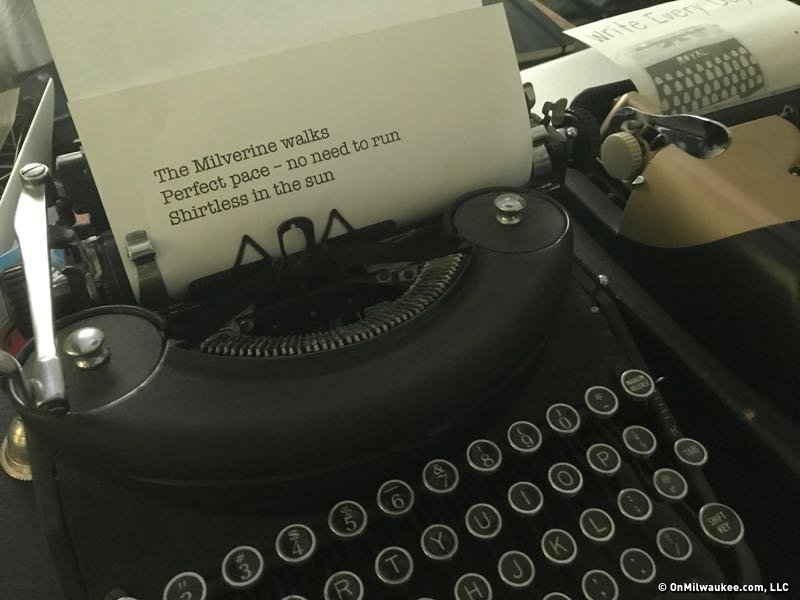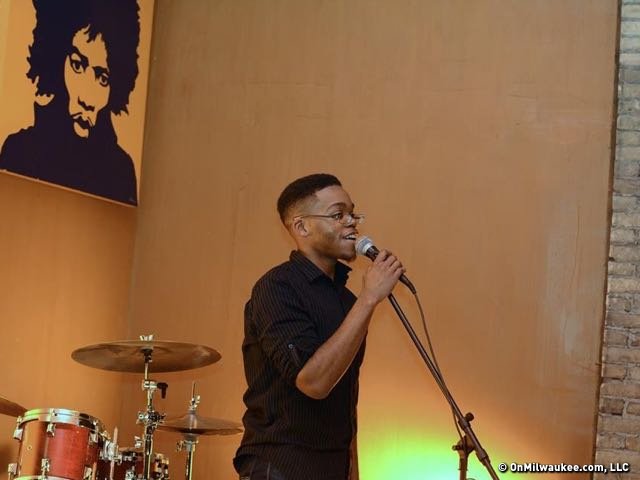Milwaukee poet Bobby Drake has been around, sharing stages with the likes of Harry Belafonte, Muhibb Dyer and former Brew City slam poet Dan Vaughn.
Now that his third record, "Hands Down," is ready to go – it is officially released Nov. 12 – Drake is getting ready to launch it with a soon-to-be announced hometown gig.
In the meantime, we caught up with him to talk about his style, his poetry and "Hands Down," a hard-hitting mix of R&B, hip-hop and other styles layered to provide a rock-solid foundation for his verse, which he calls a message of hope and perseverance.
OnMilwaukee.com: Give us the quick history of Bobby Drake, the man and the poet.
Bobby Drake: I have so many influences as Bobby Drake. The poets before my generation of poets in the city took me under their collective wings as I came onto the scene. Hitting open mics and writing with other people that had just started writing was an influence.
It turned me on to producing two live spoken word albums, a spoken word mix tape, touring the country as both an organizer and poet, mentoring other young writers and coming up with this vision for Hands Down-that’s the short version. The long version is about a hundred names and a million stories about George Webb’s on Third Street with the twin clocks at 4 in the morning.
OMC: From where do you get your inspiration?
BD: I draw inspiration from everything. It’s a cliché, I know but it’s true. If you ask me "Why?" about anything, I can write about it. When asked why I felt a way about something specifically that happened, or is happening, I started to look at all emotions, including all of my own reasoning, like it could be a poem if I wrote it down. I’d edit it and then refine it through a performance.
I'll come up with an idea, walking along just thinking out loud and I'll sit with that idea until the pieces of it come together through other experiences. It could be an article I read or the way an announcer says something on CNN. Literally, anything could inspire a poem at this point. Some things feel heavier or draw you to them like, the first Black president or the political rhetoric, but life happens all the time and it’s not always about the big explosions.
Sometimes it’s the way a man looks at a woman across the room and the way that woman looks away and flips her hair.
OMC: It's interesting how your approach as a poet, rhythmically especially, differs from what rappers do. Has it been difficult for you to find that voice or does it just come naturally?
BD: I wouldn’t say it’s been difficult but it’s been a journey. "It’s Just (Heartbreak Hotel)" was written as a poem, but it was written to the music. "Every Day" was written as a rant, a capella.
I produce music. So at first I thought that poetry had to be one way. A certain "type" of beat and a certain "type" of message and rap had to be something else. But as I matured, I realized that I was making all these beats that I still wanted to spit on. So I set out to make songs with poems. Once I got to that point it was natural. But I wouldn’t say it was a struggle to get there.
The real struggle to me is getting others to accept that I’m not trying to rap. I love most kinds of rap. I just know that’s not what I have here. It’s not what I do.
OMC: As the record progressed, I was intrigued by the variety of instrumentation on "Lady" and "Drive," for example. But then I heard "Change of the Guard." Why did you decide to use no instruments at all on that one?
BD: I wanted a poem, just a straight up and down, no frills, matter of fact, angry, poem on the album. It starts the point in the album where the heavier content kicks off and both I and Edward Cayce, my engineer, co-executive producer and good friend, thought it would be the right way to change the tone.
OMC: Have you heard the so-called dub poets from Jamaican and England? Guys like Michael Smith and Linton Kwesi Johnson? Though the music is different, that seems to me to be a lot like what you do.
BD: I can see that, I had to look them up, I'd heard of Kwesi but wasn’t too familiar with his work. Over these last few years I had looked at it like it may have been close to what Gil Scott-Heron was doing, but without me singing. Or maybe I was just full of myself. (Laughs)
Born in Brooklyn, N.Y., where he lived until he was 17, Bobby received his BA-Mass Communications from UWM in 1989 and has lived in Walker's Point, Bay View, Enderis Park, South Milwaukee and on the East Side.
He has published three non-fiction books in Italy – including one about an event in Milwaukee history, which was published in the U.S. in autumn 2010. Four more books, all about Milwaukee, have been published by The History Press.
With his most recent band, The Yell Leaders, Bobby released four LPs and had a songs featured in episodes of TV's "Party of Five" and "Dawson's Creek," and films in Japan, South America and the U.S. The Yell Leaders were named the best unsigned band in their region by VH-1 as part of its Rock Across America 1998 Tour. Most recently, the band contributed tracks to a UK vinyl/CD tribute to the Redskins and collaborated on a track with Italian novelist Enrico Remmert.
He's produced three installments of the "OMCD" series of local music compilations for OnMilwaukee.com and in 2007 produced a CD of Italian music and poetry.
In 2005, he was awarded the City of Asti's (Italy) Journalism Prize for his work focusing on that area. He has also won awards from the Milwaukee Press Club.
He has be heard on 88Nine Radio Milwaukee talking about his "Urban Spelunking" series of stories, in that station's most popular podcast.







